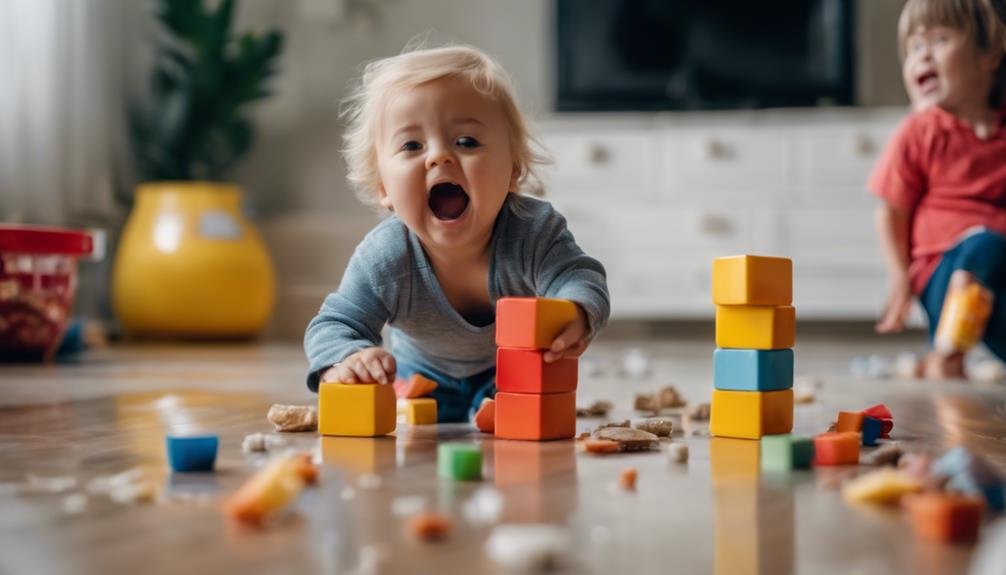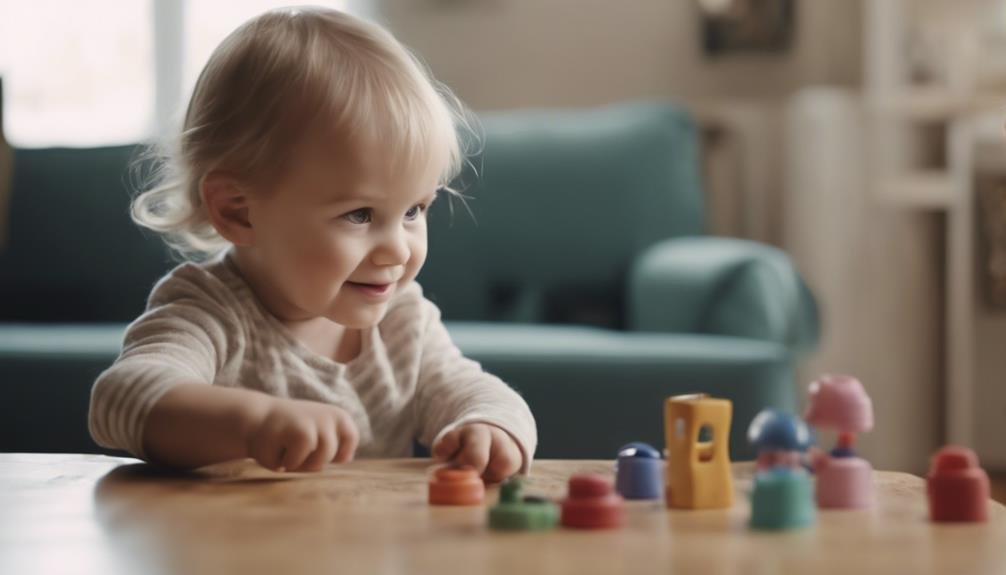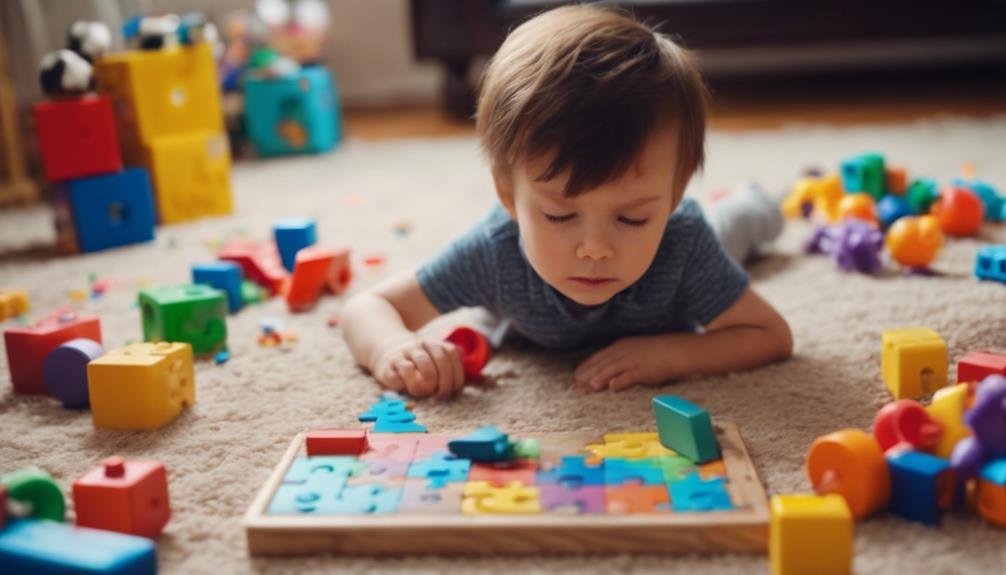"Cherishing Little Steps - A Haven for Baby and Family Journeys"
Understanding Toddler Behavior: Milestones and Challenges
As a parent, you've likely experienced the joy and challenges that come with deciphering your toddler's behavior. Those unpredictable outbursts, sudden mood swings, and newfound independence can leave you wondering what's going on in that little mind. Understanding the intricacies of toddler behavior is like unlocking a puzzle; each milestone and challenge offers a piece to the larger picture. So, what exactly drives these behaviors, and how can you navigate them successfully to foster your child's growth and development? Stay tuned to unravel the mysteries behind your toddler's actions and reactions.
Key Takeaways
- Language skills develop around 18 months with simple words like 'mama' or 'dada'.
- Emotional challenges include tantrums, separation anxiety, mood swings, and empathy development.
- Communication skills progress from babbling to simple sentences and rapid vocabulary growth after 18 months.
- Social milestones involve imitation, taking turns, empathy, making friends, and initiating interactions with peers.
- Cognitive challenges include understanding cause and effect, object permanence, problem-solving, logical reasoning, and age-appropriate toys support.
Toddler Behavior Milestones

As your child grows and develops, understanding toddler behavior milestones can provide valuable insights into their cognitive and emotional progress. One significant milestone to look out for is the development of language skills. Around the age of 18 months, your toddler may start saying simple words like 'mama' or 'dada' and begin to follow simple instructions. This is an exciting time as you witness their communication abilities expanding, allowing them to express their needs and wants more clearly.
Another crucial milestone is the emergence of social skills. At around 2 years old, your toddler may begin to show interest in playing with other children, demonstrating early signs of sharing and taking turns. Encouraging these social interactions can help foster important relationship-building skills from a young age.
Additionally, cognitive milestones, such as problem-solving abilities, start to develop around 2 to 3 years old. You may notice your child trying to stack blocks or solve simple puzzles, showcasing their growing cognitive abilities. Celebrate these milestones as they indicate your toddler's healthy development and readiness to explore the world around them.
Emotional Development Challenges
Navigating emotional development challenges with your toddler can be a rewarding yet complex journey filled with growth opportunities. Toddlers go through various emotional phases as they learn to regulate their feelings and understand the world around them. It's essential to remember that these challenges are a normal part of their development and provide chances for learning and bonding. Here are some common emotional development challenges you may encounter:
- Temper Tantrums: Toddlers often express their emotions through tantrums when they're overwhelmed or frustrated.
- Separation Anxiety: Your toddler may struggle with being separated from you, which is a natural part of their emotional growth.
- Mood Swings: Fluctuations in emotions are common as toddlers learn to navigate different feelings throughout the day.
- Empathy Development: Teaching. Teaching your toddler to understand and empathize with others can be a challenge but is crucial for their emotional intelligence.
Communication Skills Progress

When dealing with emotional development challenges, such as temper tantrums and separation anxiety, understanding your toddler's progress in communication skills can shed light on their evolving abilities to express feelings and connect with others. Communication skills progress in toddlers can vary, but there are general milestones to look out for as your little one navigates through this crucial developmental stage. Here is a table highlighting some key aspects of communication skills progress in toddlers:
| Communication Milestones | Description |
|---|---|
| Babbling | Begins around 6 months, experimenting with sounds. |
| First Words | Typically emerges around 12 months of age. |
| Gestures | Pointing, waving, and nodding start around 9-12 months. |
| Simple Sentences | Occur around 18-24 months, with basic words strung together. |
| Vocabulary Growth | Rapid expansion after 18 months, learning new words daily. |
Social Interaction Milestones
Understanding how toddlers develop social interaction skills is crucial in observing their growth and forming meaningful connections with those around them. Social interaction milestones play a vital role in shaping a child's ability to interact with others and navigate the complexities of relationships.
- Imitating Others: Toddlers often learn by imitating the behavior of those around them, which helps them understand social norms and expectations.
- Taking Turns: Learning to take turns during playtime or conversations is a significant milestone that showcases a toddler's growing awareness of social dynamics.
- Showing Empathy: As toddlers start to recognize and respond to the emotions of others, they begin to develop empathy, a crucial skill for forming positive relationships.
- Making Friends: Initiating interactions with peers and forming friendships marks an important milestone in a toddler's social development, fostering social skills and emotional intelligence.
Cognitive Development Challenges

Challenges in cognitive development can present unique hurdles for toddlers as they navigate their early learning experiences. At this stage, your little one is beginning to understand concepts like cause and effect, object permanence, and symbolic thinking. However, they may struggle with tasks that require more advanced cognitive abilities, such as problem-solving or logical reasoning. It's essential to remember that each child develops at their own pace, and these challenges are a normal part of their growth.
You might notice your toddler becoming frustrated when they can't figure something out or express their thoughts clearly. This frustration is a sign that they're encountering cognitive obstacles and trying to overcome them. As a caregiver, you can support their development by providing age-appropriate toys and activities that stimulate their cognitive skills. Simple puzzles, shape sorters, and memory games are great tools to help them enhance their problem-solving abilities and memory retention. Remember, patience and encouragement are key as your toddler tackles these cognitive challenges.
Behavioral Challenges and Solutions
Encouraging positive reinforcement techniques can help address and manage behavioral challenges in toddlers effectively. When faced with challenging behaviors, it's essential to approach them with understanding and patience. Toddlers are still developing their communication skills and emotional regulation, leading to outbursts or defiance. By implementing the following strategies, you can navigate these challenges with compassion and effectiveness:
- Consistency is Key: Establish clear and consistent rules to provide stability and predictability for your toddler.
- Redirect Attention: When a negative behavior arises, gently guide your toddler's focus towards a more appropriate activity.
- Model Good Behavior: Children learn by observing, so demonstrate the behaviors you wish to see in your toddler.
- Time-Outs with Explanation: Timeout can be an effective tool when used correctly, accompanied by a simple explanation of why the behavior was inappropriate.
Frequently Asked Questions
How Can I Encourage My Toddler to Try New Foods?
To encourage your toddler to try new foods, offer a variety of options in small portions. Make mealtime fun and positive by involving them in food preparation. Be patient and persistent, as it may take several tries before they accept new foods.
What Are Some Effective Ways to Handle Temper Tantrums?
When handling temper tantrums, remember to stay calm and provide a safe space for your toddler to express their emotions. Use gentle redirection, offer choices, and validate their feelings. Consistent, loving responses can help them learn to manage their emotions effectively.
Is It Normal for Toddlers to Have Imaginary Friends?
Yes, it's normal for toddlers to have imaginary friends. This imaginative play helps them develop social skills, creativity, and problem-solving abilities. Encourage this behavior as it's a healthy part of their cognitive development.
How Do I Help My Toddler Transition From a Crib to a Bed?
Transitioning your toddler from a crib to a bed can be daunting. Start by familiarizing them with the new setup during daytime. Create a cozy bedtime routine to ease the shift. Remember, patience and consistency are key.
What Are Some Strategies for Promoting Independence in Toddlers?
To promote independence in toddlers, encourage decision-making by offering choices, praise their efforts, and provide opportunities for them to practice new skills. Establish routines, allow them to help with simple tasks, and support their autonomy.
Conclusion
You've learned about the important milestones and challenges in toddler behavior. Remember, every child is unique and may progress at their own pace.
For example, Sarah, who struggled with sharing toys, learned to take turns with her friends by practicing patience and empathy.
By understanding and supporting toddlers through their emotional, social, and cognitive development, you can help them thrive and grow into confident, resilient individuals.
Stay patient and encouraging on this rewarding journey of guiding little ones towards their full potential.




